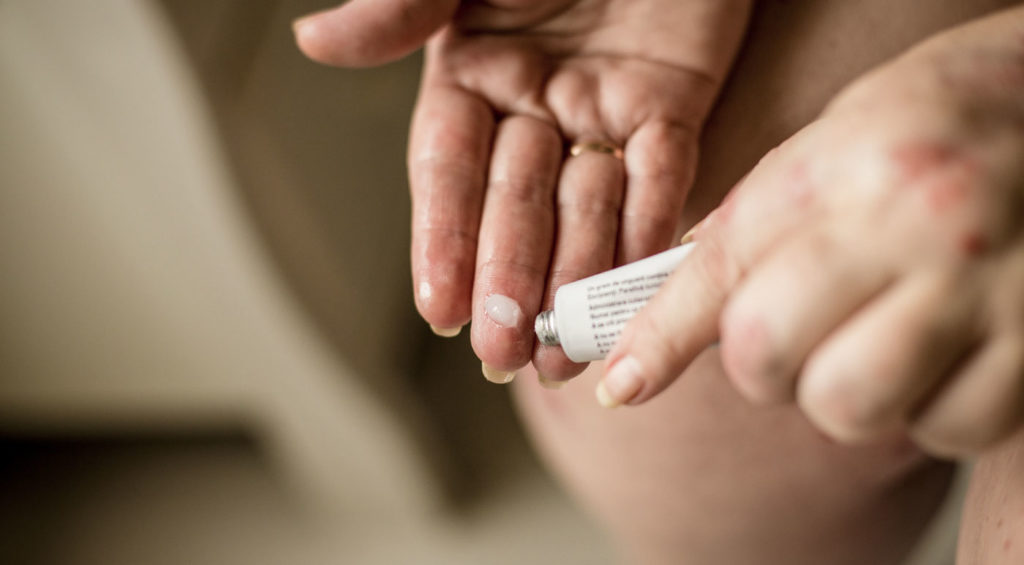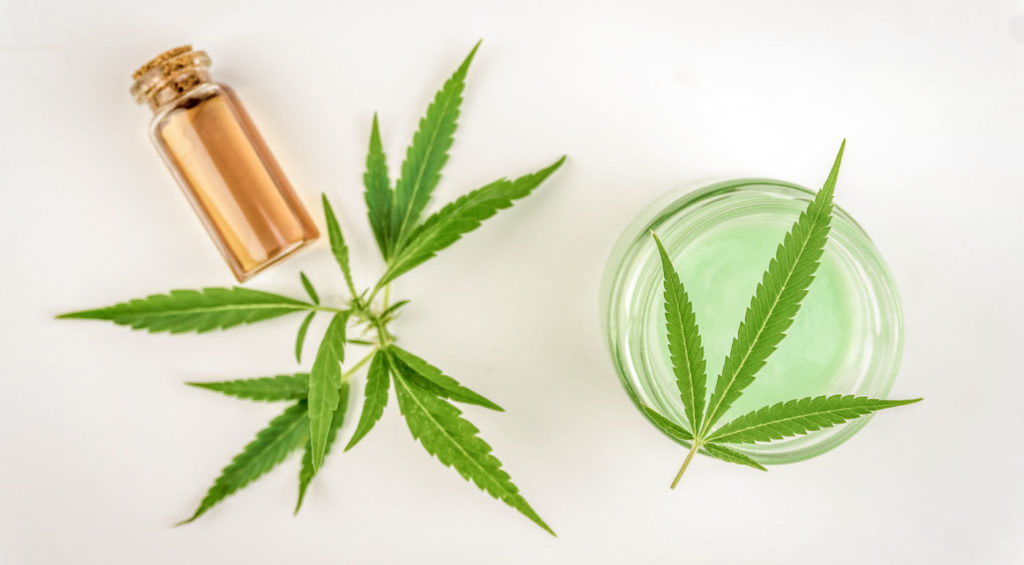
CBD products are gaining popularity in the health and wellness arena. And recently, CBD has been added to skincare products such as face creams and anti-aging products to help address skin conditions, including eczema.
There is good evidence to support the use of CBD to help alleviate symptoms of various other medical conditions such as pain, anxiety, and seizures, but what do we know so far about using CBD oil for eczema and its symptoms?
Table of Contents
- CBD Oil for Eczema: Just the Facts
- A Deeper Look into Eczema
- Traditional Treatments for Eczema
- What is CBD?
- What We Know about Using CBD Oil for Eczema
- What the Research Says About Using CBD for Eczema
- A Summary of What the Research Says
- Final Thoughts on Using CBD Oil for Eczema
CBD Oil for Eczema: Just the Facts
The cause of eczema is unknown; however, specific triggers (including stress) have been identified. Current treatments involve avoiding triggers, keeping the skin moisturized, and using steroid creams to decrease inflammation. New research is focusing on using CBD oil for eczema due to its anti-inflammatory properties.
A Deeper Look into Eczema
Eczema, also known as atopic dermatitis, is a condition that affects the skin. It is more common in children; however, many adults also suffer from eczema. It is characterized by scaly patches of skin that are both itchy and red.
Common Symptoms of Eczema
- Itchy skin
- Scaly patches
- Dry skin
- Thickened skin
Causes of Eczema
We do not entirely understand what causes eczema. However, there are certain risk factors, which include:
- A family history of eczema
- Allergies
- Asthma
For some people, their eczema rash is chronic, while others only experience symptoms during eczema flare-ups. For these people, certain triggers can bring on a flare-up. Some triggers include exposure to skin irritants (like chemical cleaners), mental health stressors like anxiety, and food allergies.
Traditional Treatments for Eczema

Treating eczema involves preventative measures as well as treatments for flare-ups.
Preventative Measures
Every person with eczema has different triggers, and identifying an individual’s triggers is the first step. For some people, the foods they eat and the soaps they use impact their eczema flare-ups. Using gentle, unscented soaps and topical creams and moisturizers like coconut oil is helpful for some. Other people have found that natural products like tea tree oil or fatty acid supplements like fish oil are helpful.
Eczema Treatment
When flare-ups occur, treatment options are available. The most common treatments are steroid creams that decrease inflammation, which then helps reduce itchiness and redness. However, topical steroids have side effects when they’re used for long periods. These include thinning of the skin and an increased risk of infection.
Another approach is the one recommended by The American Academy of Dermatology, which is taking a diluted bleach bath, as bleach is anti-microbial and reduces the risk of infections.
The current treatment approach to eczema helps some people, but for many, their symptoms keep coming back. Understanding and avoiding triggers is essential, as are therapies that help manage flare-ups but do not cause side effects. This has led to the exploration of CBD oil for eczema.
What is CBD?
CBD, or cannabidiol, is a phytocannabinoid found in the industrial hemp plant, which is a type of cannabis plant. The hemp plant is different from the marijuana plant in that the hemp plant contains very low levels of tetrahydrocannabinol (THC)—the psychoactive component of marijuana that makes people feel “high.”
CBD is legal to buy and sell all across the United States as long as the products contain less than 0.3% THC. CBD products are not currently regulated in the United States, which means you need to be careful when choosing these products. Companies that use third party testing do so to help ensure that the purity and quality match what the label reads. A reputable source can help you learn about the best CBD products to use.
CBD can be applied topically in a lotion, it can be vaped, or it can be ingested orally in capsules or edible treats.
What We Know about Using CBD Oil for Eczema

CBD is being looked at for skin conditions like eczema due to its anti-inflammatory properties.
CBD’s anti-inflammatory effects occur through stimulation of cannabinoid receptors within the body’s endocannabinoid system. This is a system that runs through our body and influences the release of inflammatory chemicals (also called cytokines), emotions, behaviors, and pain levels.
In addition, anandamide is a cannabinoid found in CBD products that has been found to relieve skin itchiness.
Since eczema is considered an inflammatory condition of the skin, reducing inflammation is an integral part of managing its symptoms.
The research regarding the use of CBD oil for eczema (and other skin conditions in general) is just beginning. There have been some positive human studies that support CBD’s effectiveness at reducing eczema symptoms for some people.
What the Research Says About Using CBD for Eczema
A recent study looked at the effect of a topical CBD cream on various inflammatory skin conditions, including eczema. They found significant improvements in skin elasticity, hydration, and reduced itchiness.
Another study found that topical CBD was helpful in managing eczema flare-ups, and was even more effective when taken orally.
The Online Dermatology Journal conducted a review of the current research on CBD for eczema and stated that CBD shows excellent potential in helping manage many types of skin conditions.
“However, the majority of available data on these compounds are pre-clinical, and there is a corresponding lack of high-quality randomized, controlled trials that evaluate their effects. Cannabinoids have shown some initial promise as a therapy for a variety of skin diseases. However, there is a requirement or thorough pre-clinical research, and large-scale, randomized, controlled trials before cannabinoids can be considered safe and effective treatments for these conditions.”
Online Dermatology Journal
CBD and Anxiety
As previously mentioned, stress can be a trigger for an eczema flare-up. Research studies have found that CBD has a potent anti-anxiety effect, which could be helpful in preventing eczema flares for some people.
A Summary of What the Research Says

The research on using CBD oil for eczema and its symptoms is just beginning; however, early studies are promising.
CBD has been shown to decrease inflammation by stimulating the endocannabinoid system.
Two studies have found that topical CBD can be effective at reducing eczema symptoms, and one noted that adding oral CBD improved results for study participants.
Final Thoughts on Using CBD Oil for Eczema
Eczema causes itchy, scaly rashes that can be both painful and annoying. There have only been a few studies on using CBD for eczema, but so far, the future of CBD oil for helping manage eczema looks bright.
